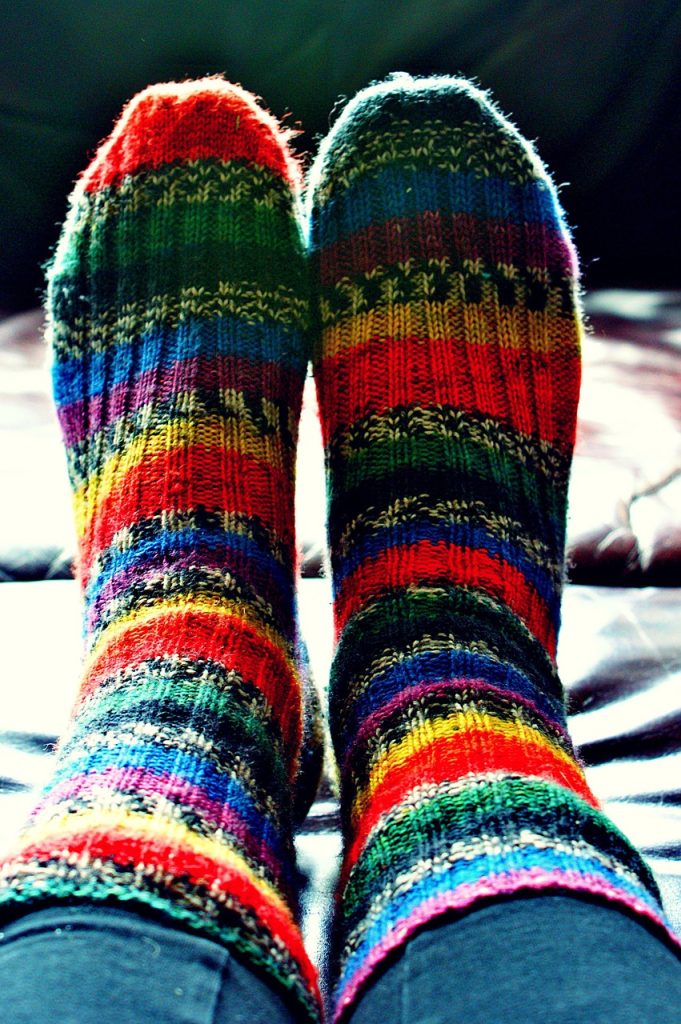In recent years, there has been a significant shift towards sustainability in the fashion industry. Consumers are becoming increasingly aware of the environmental impact of their clothing choices, and many brands are responding by adopting eco-friendlier practices. Custom socks, like other apparel items, have not been immune to this trend. As people seek to express their personal style while minimizing their environmental footprint, the demand for eco-friendly custom socks has surged.
This article delves into the world of sustainable materials for custom socks, exploring how brands and consumers can make greener choices without compromising on quality, comfort, or style. From organic cotton to innovative recycled fibers, we’ll take a closer look at the materials that are helping to make custom socks more environmentally responsible.
1. The Growing Demand for Eco-Friendly Custom Socks
The Environmental Impact of Traditional Socks
Traditional sock production, like much of the textile industry, has historically relied on materials and processes that have significant environmental consequences. The most common materials used in socks, such as conventional cotton and synthetic fibers like polyester and nylon, have a notable impact on the environment.
- Conventional Cotton: Cotton is a widely used natural fiber, but conventional cotton farming is resource-intensive. It requires large amounts of water, pesticides, and fertilizers, which can lead to soil degradation, water pollution, and a loss of biodiversity. Additionally, the processing of cotton into fabric involves the use of chemicals and energy, contributing to pollution and carbon emissions.
- Synthetic Fibers: Synthetic fibers like polyester, nylon, and acrylic are derived from petrochemicals, making them non-renewable and energy-intensive to produce. The production of these fibers contributes to greenhouse gas emissions and environmental pollution. Furthermore, synthetic fibers are non-biodegradable and can release microplastics into the environment during washing and wear, posing a threat to marine life and ecosystems.
The Shift Towards Sustainable Fashion
As awareness of the environmental impact of the fashion industry has grown, consumers have increasingly sought out sustainable alternatives. This shift is driven by a desire to reduce the carbon footprint of clothing, promote ethical practices, and support brands that prioritize environmental stewardship.
- Consumer Awareness: Modern consumers, particularly millennials and Gen Z, are more informed about the environmental and social implications of their purchases. They are increasingly looking for products that align with their values, including sustainability, ethical sourcing, and transparency in production.
- Brand Response: In response to this growing demand, many brands have begun to integrate sustainability into their product lines. This includes the use of eco-friendly materials, reducing waste in production, and adopting ethical manufacturing practices. Custom sock manufacturers are no exception, offering a range of sustainable options to meet the needs of environmentally conscious consumers.
The Role of Custom Socks in Sustainable Fashion
Custom socks have become a popular way for individuals and brands to express their identity, promote causes, and even market their products. However, as demand for custom socks grows, so does the need to ensure that these products are made in an environmentally responsible way.
- Personal Expression with a Purpose: Custom socks allow individuals to express their personal style, support causes they care about, or represent their brand or team. By choosing eco-friendly materials for custom socks, consumers can ensure that their choices align with their values and contribute to a more sustainable future.
- Corporate Responsibility: For brands that offer custom socks as merchandise or promotional items, using sustainable materials is an opportunity to demonstrate corporate responsibility. By opting for eco-friendly options, brands can enhance their reputation, appeal to environmentally conscious consumers, and reduce their overall environmental impact.
2. Sustainable Materials for Eco-Friendly Custom Socks
To make custom socks more eco-friendly, manufacturers are turning to a variety of sustainable materials. These materials are chosen for their lower environmental impact, renewable nature, and ability to be produced with fewer resources.
Organic Cotton: A Natural and Sustainable Choice
Organic cotton is one of the most popular materials for eco-friendly custom socks. Unlike conventional cotton, organic cotton is grown without the use of synthetic pesticides, fertilizers, or genetically modified organisms (GMOs). This results in a cleaner, more sustainable farming process that has numerous environmental benefits.
- Reduced Chemical Use: Organic cotton farming eliminates the need for harmful chemicals, reducing the risk of water contamination, soil degradation, and harm to wildlife. This also benefits the health of farmers and workers, who are not exposed to toxic substances.
- Water Conservation: Organic cotton farming often uses more sustainable water management practices, such as rain-fed agriculture, which reduces the strain on water resources. This is particularly important in regions where water scarcity is a concern.
- Soil Health: By avoiding synthetic fertilizers and using crop rotation and composting, organic cotton farming helps maintain and improve soil health. Healthy soil is better able to retain water, support biodiversity, and sequester carbon, contributing to a more sustainable agricultural system.
- Certification and Traceability: Many organic cotton products are certified by organizations like the Global Organic Textile Standard (GOTS), which ensures that the cotton is grown and processed according to strict environmental and social criteria. This certification provides consumers with confidence that their custom socks are truly sustainable.
Recycled Fibers: Giving Waste a Second Life
Recycling is a key component of sustainability, and recycled fibers are becoming an increasingly popular choice for eco-friendly custom socks. These fibers are made from post-consumer or post-industrial waste, such as plastic bottles, discarded textiles, or manufacturing scraps, which are processed and spun into new yarns.
- Recycled Polyester: Recycled polyester, also known as rPET, is made from recycled plastic bottles. The bottles are cleaned, shredded, and melted down to create new polyester fibers. Using recycled polyester reduces the demand for virgin petroleum-based polyester, conserving resources and reducing carbon emissions.
- Recycled Nylon: Similar to recycled polyester, recycled nylon is made from waste materials such as discarded fishing nets, fabric scraps, or old nylon stockings. Recycled nylon requires less energy to produce than virgin nylon and helps divert waste from landfills and oceans.
- Recycled Cotton: Recycled cotton is made from post-consumer or post-industrial cotton waste, such as old garments or manufacturing off-cuts. The waste is collected, sorted, and mechanically shredded into fibers, which are then spun into new yarns. Recycled cotton reduces the need for new cotton production, conserving water and reducing the use of pesticides.
- Environmental Benefits: By using recycled fibers, custom sock manufacturers can significantly reduce the environmental impact of their products. Recycling conserves resources, reduces energy consumption, and minimizes waste, making it a key strategy for sustainable fashion.
Bamboo: A Rapidly Renewable Resource
Bamboo is a fast-growing plant that has gained popularity as an eco-friendly material for textiles, including custom socks. Bamboo is known for its rapid growth rate, with some species growing up to three feet per day, making it one of the most renewable resources available.
- Low Environmental Impact: Bamboo requires minimal water and no pesticides or fertilizers to grow, making it a low-impact crop. Its deep root system helps prevent soil erosion, and it can thrive in a variety of climates and soil types.
- Biodegradability: Bamboo is a natural fiber that is biodegradable, meaning it will break down naturally over time without leaving harmful residues in the environment. This makes bamboo socks a more sustainable option compared to synthetic fibers.
- Comfort and Performance: Bamboo fibers are naturally soft, breathable, and moisture-wicking, making them ideal for socks. Bamboo socks are also hypoallergenic and have natural antibacterial properties, which can help reduce odor and keep feet fresh.
- Sustainable Processing: It’s important to note that the sustainability of bamboo textiles depends on how the bamboo is processed. Mechanical processing, which involves crushing the bamboo and using natural enzymes to extract the fibers, is the most eco-friendly method. However, some bamboo textiles are made using chemical processes that are less sustainable. Consumers should look for certifications, such as OEKO-TEX or GOTS, to ensure that the bamboo socks they purchase are produced in an environmentally responsible way.
Hemp: A Durable and Eco-Friendly Fiber
Hemp is another natural fiber that has gained attention for its sustainability and versatility. As one of the oldest cultivated crops in the world, hemp has been used for thousands of years to make textiles, ropes, and paper. Today, it is being rediscovered as a sustainable material for clothing, including custom socks.
- Low Resource Requirements: Hemp is a hardy plant that requires little water, no pesticides, and minimal fertilizers to grow. It can be cultivated in a variety of climates and soil conditions, making it an environmentally friendly crop.
- Soil Regeneration: Hemp’s deep root system helps improve soil structure, prevent erosion, and promote nutrient cycling. It is often used in crop rotation systems to replenish soil health and reduce the need for chemical inputs.
- Durability: Hemp fibers are known for their strength and durability, making them ideal for socks that need to withstand regular wear and washing. Hemp socks are less likely to stretch out or wear thin, extending the life of the product and reducing waste.
- Breathability and Comfort: Hemp fibers are naturally breathable and moisture-wicking, helping to keep feet cool and dry. They also have antimicrobial properties, which can help prevent odor and bacterial growth.
- Eco-Friendly Processing: Like bamboo, the sustainability of hemp textiles depends on the processing methods used. Mechanical processing is the most sustainable option, as it involves minimal chemical use. Hemp textiles that are certified by organizations like GOTS or the Organic Trade Association (OTA) are produced in an environmentally responsible manner.
Tencel (Lyocell): A Sustainable Alternative to Traditional Fibers
Tencel, also known as lyocell, is a sustainable fiber made from wood pulp, typically sourced from eucalyptus, beech, or spruce trees. Tencel has gained popularity as an eco-friendly alternative to traditional fibers due to its environmentally responsible production process and desirable properties.
- Sustainable Sourcing: The wood used to produce Tencel is sourced from sustainably managed forests, ensuring that the raw material is renewable and responsibly harvested. Eucalyptus trees, in particular, are fast-growing and require little water or pesticides, making them an ideal source for Tencel production.
- Closed-Loop Production: Tencel is produced using a closed-loop process, which means that the solvents and chemicals used in the production are recycled and reused, minimizing waste and environmental impact. This process is less harmful to the environment compared to traditional textile manufacturing.
- Biodegradability: Tencel is a biodegradable fiber, meaning it will break down naturally over time without contributing to pollution. This makes Tencel socks a more sustainable option compared to synthetic fibers.
- Comfort and Performance: Tencel fibers are known for their softness, breathability, and moisture-wicking properties. Tencel socks are comfortable to wear and help keep feet dry and cool, making them suitable for everyday use and athletic activities.
- Certification: Tencel is often certified by organizations like OEKO-TEX, which ensures that the fiber is free from harmful substances and produced in an environmentally responsible way. This certification provides consumers with confidence that their custom socks are both safe and sustainable.
Merino Wool: A Natural and Renewable Fiber
Merino wool is a natural fiber sourced from Merino sheep, known for its softness, warmth, and moisture-wicking properties. While wool has been used for clothing for centuries, Merino wool is particularly valued for its high-quality fibers and sustainability.
- Renewable Resource: Wool is a renewable resource, as sheep naturally produce new fleece each year. This makes wool a sustainable option for textiles, as it can be continually harvested without depleting resources.
- Biodegradability: Merino wool is biodegradable, meaning it will break down naturally in the environment without leaving harmful residues. This makes Merino wool socks a more sustainable option compared to synthetic fibers.
- Moisture Management: Merino wool fibers have a unique structure that allows them to absorb moisture while still feeling dry to the touch. This makes Merino wool socks ideal for outdoor activities, as they help keep feet dry and comfortable in various weather conditions.
- Temperature Regulation: Merino wool is naturally insulating, providing warmth in cold weather while remaining breathable in warmer conditions. This versatility makes Merino wool socks suitable for year-round wear.
- Ethical Sourcing: When choosing Merino wool products, it’s important to consider the ethical treatment of the sheep. Look for certifications like Responsible Wool Standard (RWS) or ZQ Merino, which ensure that the wool is sourced from farms that prioritize animal welfare and environmental stewardship.
3. Designing and Producing Eco-Friendly Custom Socks
Once you’ve selected sustainable materials for your custom socks, the next step is to consider the design and production process. Designing and producing eco-friendly custom socks involves making choices that minimize environmental impact while ensuring high-quality, comfortable, and stylish products.
Sustainable Design Principles
Eco-friendly design principles focus on creating products that are both functional and environmentally responsible. Here are some key considerations when designing custom socks:
- Minimalist Design: Consider adopting a minimalist design approach that uses fewer materials and reduces waste. For example, choosing simple patterns, solid colors, or subtle logos can minimize the amount of dye and chemicals used in production.
- Efficient Sizing: Producing socks in standard sizes that fit a wide range of foot sizes can reduce the need for multiple production runs, saving resources and energy. Additionally, offering unisex designs can simplify production and reduce waste.
- Eco-Friendly Inks and Dyes: Choose eco-friendly inks and dyes for printing or coloring your custom socks. Water-based inks and natural dyes are less harmful to the environment and reduce the risk of water pollution during the production process.
- Low-Waste Production: Work with manufacturers who prioritize low-waste production methods, such as optimizing fabric cutting patterns to minimize off-cuts and using leftover materials for other products.
Ethical Manufacturing Practices
In addition to choosing sustainable materials, it’s important to consider the ethical practices of the manufacturers producing your custom socks. Ethical manufacturing practices ensure that the production process is socially responsible and minimizes harm to people and the environment.
- Fair Labor Practices: Ensure that the manufacturers you work with adhere to fair labor practices, including safe working conditions, fair wages, and the prohibition of child labor. Certifications like Fair Trade or SA8000 can provide assurance that the production process meets ethical standards.
- Energy Efficiency: Choose manufacturers that use energy-efficient processes and renewable energy sources in their production facilities. Reducing energy consumption helps lower the carbon footprint of your custom socks.
- Waste Reduction: Look for manufacturers that prioritize waste reduction, recycling, and responsible disposal of waste materials. This can include recycling water used in dyeing processes, repurposing fabric scraps, or implementing closed-loop production systems.
- Transparency: Work with manufacturers that are transparent about their sourcing, production, and environmental impact. Transparent practices build trust with consumers and ensure that your custom socks meet the highest sustainability standards.
Packaging and Distribution
The packaging and distribution of custom socks also play a role in their overall environmental impact. Choosing eco-friendly packaging materials and distribution methods can further reduce the carbon footprint of your products.
- Sustainable Packaging: Opt for sustainable packaging materials, such as recycled paper, biodegradable plastics, or reusable packaging. Avoid excessive packaging and consider using minimalist designs that reduce waste.
- Bulk Shipping: Shipping socks in bulk rather than individually can reduce packaging waste and transportation emissions. Consider offering bulk purchase options to consumers or retailers to minimize the environmental impact of distribution.
- Carbon Offset Programs: Consider partnering with carbon offset programs to neutralize the emissions associated with the production and shipping of your custom socks. This can include supporting reforestation projects, renewable energy initiatives, or other carbon reduction efforts.
4. The Future of Sustainable Custom Socks
As sustainability becomes increasingly important in the fashion industry, the future of custom socks will likely see continued innovation in materials, production methods, and consumer engagement. Here are some trends and developments to watch for in the future of sustainable custom socks:
Innovative Materials
The development of new and innovative materials will continue to drive the evolution of sustainable custom socks. Researchers and manufacturers are exploring alternative fibers, biopolymers, and other eco-friendly materials that have the potential to further reduce the environmental impact of sock production.
- Biodegradable Polymers: Biodegradable polymers made from renewable resources, such as cornstarch or algae, are being developed as alternatives to traditional synthetic fibers. These materials break down naturally in the environment, reducing waste and pollution.
- Lab-Grown Textiles: Advances in biotechnology are making it possible to grow textiles in a lab, using processes that mimic natural fiber production. Lab-grown textiles, such as biofabricated silk or mycelium-based leather, offer the potential for more sustainable and cruelty-free alternatives to traditional materials.
- Circular Economy: The concept of a circular economy, where products are designed to be reused, repaired, or recycled, is gaining traction in the fashion industry. Future custom socks may be designed with end-of-life considerations in mind, such as being fully recyclable or compostable.
Sustainable Consumer Behavior
Consumer behavior plays a critical role in the sustainability of custom socks and other fashion products. As awareness of environmental issues grows, consumers are increasingly making choices that align with their values.
- Mindful Consumption: Consumers are becoming more mindful of their purchasing habits, opting for quality over quantity and choosing products that are built to last. This shift towards mindful consumption reduces waste and encourages the production of durable, sustainable products.
- Second-Hand and Upcycling: The popularity of second-hand shopping and upcycling is expected to continue growing. Consumers are embracing the idea of giving new life to old products, whether by purchasing pre-owned items or creatively repurposing them.
- Eco-Friendly Brands: Consumers are increasingly seeking out brands that prioritize sustainability and ethical practices. Brands that are transparent about their environmental impact and committed to continuous improvement are likely to attract loyal, environmentally conscious customers.
Technological Advancements in Manufacturing
Technological advancements in manufacturing will play a key role in the future of sustainable custom socks. These innovations have the potential to reduce the environmental impact of production while improving efficiency and quality.
- 3D Knitting: 3D knitting technology allows for the creation of seamless, customized socks with minimal waste. This technology can reduce material waste, energy consumption, and production time, making it a more sustainable option for custom sock manufacturing.
- Waterless Dyeing: Waterless dyeing technologies, such as supercritical CO2 dyeing, offer a more sustainable alternative to traditional dyeing processes. These methods eliminate the need for water and reduce the use of chemicals, minimizing the environmental impact of sock production.
- Automation and AI: Automation and artificial intelligence (AI) are transforming manufacturing processes, improving efficiency and reducing waste. Automated systems can optimize material usage, reduce energy consumption, and ensure consistent quality in custom sock production.
Stepping Into a Greener Future with Custom Socks
The shift towards sustainability in the fashion industry is more than just a trend; it is a necessary response to the environmental challenges we face. Custom socks, as a popular and versatile fashion item, have the potential to play a significant role in promoting eco-friendly practices and reducing the environmental impact of the clothing industry.
By choosing sustainable materials like organic cotton, recycled fibers, bamboo, hemp, Tencel, and Merino wool, consumers and brands can make a positive impact on the environment while enjoying high-quality, comfortable, and stylish custom socks. Additionally, by adopting sustainable design principles, ethical manufacturing practices, and eco-friendly packaging and distribution methods, the custom sock industry can continue to innovate and lead the way in sustainable fashion.
As we step into a greener future, the choices we make in the products we buy, wear, and promote will have a lasting impact on the planet. By prioritizing sustainability in custom sock production, we can create a more responsible and environmentally conscious fashion industry, one step at a time.
If you are interested in purchasing high-quality custom socks, feel free to contact us at 1-877-912-6410 or fill out a FREE QUOTE FORM.



